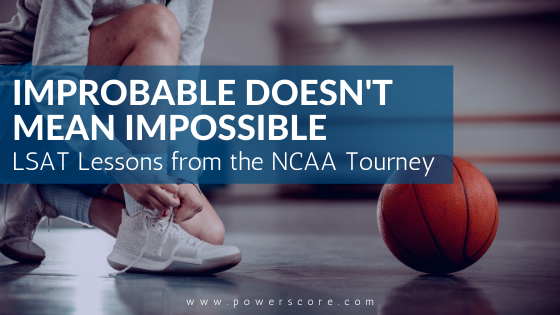Tonight, the NCAA Basketball Tournament returns to action, and one of the notable games pits Texas A&M against Oklahoma. Why is this notable? Because there’s no way Texas A&M should be in this game. But they pulled a miracle escape against Northern Iowa and won the game in double overtime. As always, whenever I watch sports, thoughts of the LSAT aren’t far from my mind. The question is, what can we learn from their incredible comeback, and others like it?
The Dramatic Finish
With 44 seconds left in regulation, Northern Iowa was up by 12 points, 69-57. In most games, this is the point where you watch the trailing team go through the motions, and you can tell they don’t expect to win or even to get all that close. In this case, Texas A&M could be forgiven for thinking the game was over. No team had ever come back from 12 points down in the last minute of any NCAA Division I game, ever. But the Aggies didn’t give up—they fought back, and in the process recorded a historic victory, and one of the greatest comebacks in NCAA basketball history. Aggies senior guard Danuel House said, “We knew it was kind of impossible, man, but we just said that we were going to fight until the end.”
A different kind of comeback happened back in the 2001 Final Four. In the national semifinal, Duke faced Maryland for the fourth time that season, and the Terps raced out to a 39-17 lead just 13 minutes into the game. But Duke didn’t give up. They clawed their way back, and ultimately won the game by 11. It remains the largest deficit ever overcome in Final Four History. Side note: that wasn’t the only amazing comeback by Duke against Maryland that season. Earlier in the year, Duke trailed Maryland by 10 in College Park with only 54 seconds remaining. Jason Williams went on a tear (8 points in 13 seconds) and Duke forced overtime before winning the game. Duke had two epic comebacks on Maryland that year, but clearly Maryland learned a few things since they went on to win the national title in 2002.
All Comebacks Start with Belief
Historic comebacks like this are rare, but the key is that they start with belief. If you don’t think you have a chance, there’s no way you can make comebacks of this magnitude. In the same way, your LSAT preparation has to be underpinned by an unwavering self-belief. You can’t get the score you want unless you believe you can do it.
Overcoming Difficulty on Test Day
The second lesson is that if the LSAT throws a few punches your way, you can’t simply fold up the tents and go home. You can’t panic, and you have to fight back. A&M had played poorly for 39 minutes, but still didn’t give up hope. Similarly, Duke was down by 22 in their biggest game of the year to a team that had just beaten them a month earlier, but they didn’t give up. They went back to basics, kept working steadily, and prevailed rather easily in the end.
So, if you run into a hard Logic Game or reading passage early in the section, don’t let it unsettle you. Tough LR section out of the gate? Keep calm and power your way through it, and then crush the rest of the exam. Don’t get fazed by adversity; instead use it to your advantage. If you can overcome some difficulty on test day, especially early, you’ll feel energized and can end on a high note.
Have any questions or comments? Please post them below!

